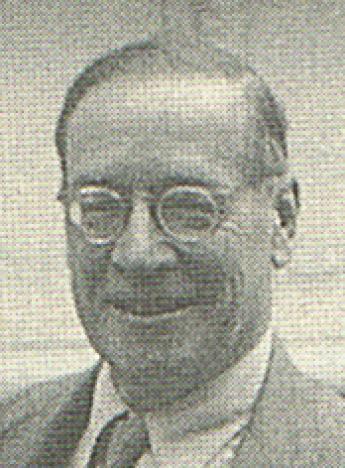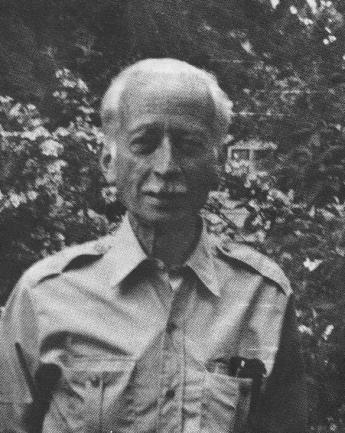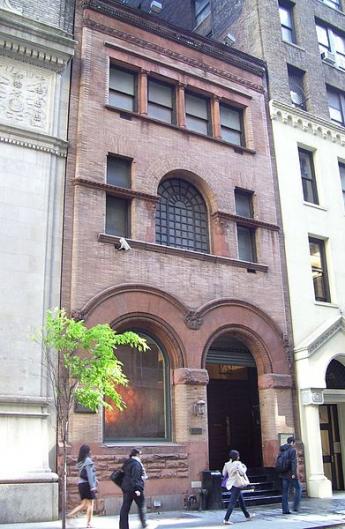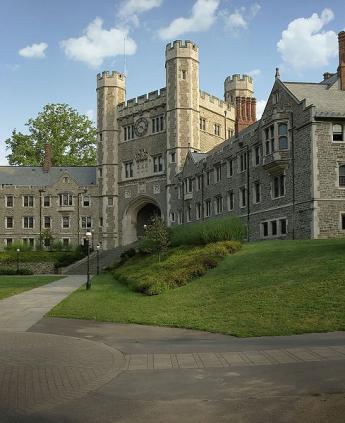Events Antiquarian Booksellers' Association of America
1959 - New York

The Antiquarian Booksellers’ Association of America (ABAA) was founded in 1949. In the same year Laurence Gomme, the first ABAA President, attended the 2nd ILAB Congress in London as an observer, and a year later the American association was officially welcomed as a new member of the League during the 3rd Congress in Paris. It took only a few more years until the ILAB affiliates were invited to the United States: to New York in 1955, and again in 1959. The 12th ILAB Congress was held in New York from 20th to 25th September, 1959. And it was bigger than ever before.
The League's agenda was completed in record time, with - as many foreign delegates observed - “typical American business efficiency.” ILAB President Wormser explained the ILAB method of voting. Based on their number of members some associations have one vote, others have two. And Wormser commented happily that the last-minute arrival of Susan Bach (Brazil) made “easier the lot of Harry Pratley, President ABA, who was to act as proxy for Brazil, since otherwise he would have had to raise a foot as well as both hands in voting".
Rules and regulations of the international trade were discussed, and it was concluded to published a printed ILAB Newsletter. Invitations for further conferences were greeted with applause. After New York the ILAB delegates would met in Scheveningen ("a seashore suburb of The Hague"), France, Switzerland, Belgium and Brazil. But first of all, they were going to have a wonderful time in New York.
Read the report from The Clique and the ABA Newsletter:

LEAGUE AGENDA
At 2.40 pm, Monday, September 21st, Richard S. Wormser (ILAB President), formally opened the 12th Congress of the International League of Antiquarian Booksellers, at the Carnegie Endowment Building, with some 60 officially accredited delegates attending.
Announcement was made of the death of Kenneth Maggs (Maggs Bros. London) the preceding Friday, and the president asked that all arise for a minute of silence in memory of him, and of other dealers who had died during the year.
First business was appointment of tellers: Walter Schatzki (US) and W. R. Fletcher (England). Announcement was made of delegatio of proxy by Austria to Switzerland, and the Netherlands to France. Telegrams were read from M. Hertzberger (“Father of the League”) regretting his inability to attend because of ill health. André Poursin and Percy Muir (Presidents of Honour) and Einar Gronholdt-Pedersen (retiring committee-man) also regretted their absence.
President Wormser explained the ILAB method of voting: England, France and US each had two votes, others one each. (Based on membership total). He also commented happily on the last-minute arrival of Dr. Susan Bach (Brazil). This, he noted, made “easier the lot of Harry Pratley (president ABA, who was to act as proxy for Brazil) since otherwise he would have had to raise a foot as well as both hands in voting.”
The treasurer’s report was read, explained and accepted, with a vote of thanks to the “tireless efforts” of the League treasurer, G. A. Deny (Belgium). Announcement was made of the subscriptions paid to ILAB by each national association, based on a per capita scale. Although no increase was asked, Wormser urged that presidents re-examine their subscriptions, with view to increase if possible. He pointed out that Austria had already voluntarily raised its contribution by 10%.
The floor was open to suggestions for ways to increase League funds, with Schatzki noting that many dealers had no foreign trade: those who did might well put aside for ILAB a certain percentage of their foreign business. Bach suggested that dealers contribute proceeds of sale of selected books from stock. Michael Papantonio (ABAA President) asked that ILAB be remembered in members’ wills. J. S. Canner (US) pointed out possibility of low-cost group life insurance with the ILAB as beneficiary. Other methods of raising funds were suggested, and the chair congratulated the delegates for their interest. All ideas would be considered by the ILAB Committee.
ILAB vice-president, Dr. Ernst L. Hauswedell (Germany), reported on status, sales, etc. of the League’s publications: the “Dictionary of the Antiquarian Book Trade” and the “International Directory of Antiquarian Booksellers”. He announced the publication of a 4-page descriptive leaflet, copies of which would be sent ot all members; he asked that dealers use them in promoting sale of the books as well as listing them in their catalogues …
Prospects of an ILAB newsletter were then discussed. Three issues of an informal newsletter had been compiled by Wormser and sent to the presidents of each associations and to members of the ILAB Committee. These had contained resumes of executive committee meetings, changes in administration, membership, exhibits, stolen books, and other activities. Results had been spotty, some presidents had contributed material, others had not. Wormser hoped that all associations would adopt uniform and regular method of contribution data, especially on government restrictions, tariffs, regulations affecting world trade since ILAB’s 1955 bulletin on subject. Discussion followed on method of distribution of newsletters, whether copies should go only to associations or directly to individual members. As individuals are not members of the League, but of their national association, direct distribution might be contrary to the League’s established policy of dealing only with associations. Wormser pointed out that for a newsletter to be effective, some means must be found to apprise individual members of important contents. He felt no re-distribution by presidents could be effective. Therefore Wormser hoped that he would not be considered to contravene Rule n°7 (sovereignty of associations) if he asked for vote which would give permission to the Committee to send newsletters direct to individual members through the presidents. Passed.
FUTURE CONGRESSES
Fernand De Nobele (France), acting as proxy to the Netherlands, issued an invitation by the Nederlandsche Vereeniging van Antiquaren to hold the next ILAB Congress at Scheveningen (a seashore suburb of The Hague) on Aug. 29th-Sept. 3rd, 1960. Accepted with enthusiasm.
“As it has become only too obvious in past few years, the League could no longer depend on last-minute invitations.” There had been previous discussions by the presidents, with the following result:
Mr. Blauheteau, for the Syndicat de la Librairie Ancienne et Moderne, invited the League to hold Congress in France for 1961.
Alfred Frauendorfer, for the Syndicat de la Librairie Ancienne et du Commerce de l’Estampe en Suisse, invited the League to Switzerland for 1962.
Florimond Tulkens, for the Syndicat de la Librairie Ancienne et Moderne, invited the League to Belgium for 1963.
Dr. Susan Bach, for the Associacao Brasileira de Livrreiros Antiquarios, invited the League to Brazil, 1964.
[This is the first time in history of League that formal invitations have been received for more than a year in advance].
Great Britain had previously proposed: “That Congresses should be held in rotation by all countries affiliated to the League…”, but in the light of the League’s five-year plan for Congresses, Pratley formally withdrew the proposal of the British ABA.
Announcement was made of the retirement of Einar Gronholt-Pedersen from the Executive Committee. Wormser, Sawyer, Tulkens, and Gomme paid tribute to his services to the League as Committee man from its beginning. Frauendorfer was unanimously elected to replace him. As a last bit of business, Tulkens suggested that Unesco be asked to send a special representative for future meetings of the League.
[League agenda was completed in record time, with - as many foreign delegates observed - “typical American business efficiency.”]


ILAB SOCIAL PROGRAMME
Although the Congress itself officially began on Monday, Sept. 21st, a reception and cocktail party at the Grolier Club the preceding afternoon, opened a memorable week of social events for the delegates and members of the ABAA. From 5.30 to 7.30 pm, well over 200 persons thronged the main exhibit room of the Grolier. Papantonio and Wormser thanked the Grolier Club for ABAA and ILAB, respectively, for making the facilities available, and both promised to make the coming week of the Congress “interesting to all of you.” Food and drink were on hand in bountiful quantities, but here was one place where books came first.
In honour of the Twelfth ILAB Congress, Grolier had mounted a special exhibit of “Historical and Literary Americana”, highlights from the collections of Thomas W. Streeter and C. Waller Barrett. [Yes, they both have some mighty fine books left!].
In one of his rare public appearances, Streeter spoke for a few minutes:
“I came to see principally Barrett’s collection of American literature… I want to pay tribute to Roland Tree and Mike Walsh in my 40 years of buying… I hope you will enjoy the exhibit. … Collecting has been my good fortune, … It’s a great game”.
Barrett:
“As president of the Grolier Club, we are happy indeed to welcome you on behalf of collectors. .. We were thrilled when you selected US as host country and glad to reciprocate hospitality when Grolier had its 75th celebration abroad. … Feel free to use Grolier while in NY… A hearty welcome to your Congress. May it be instructive, enjoyable, and above all, inspiring …”
[Alas! There was little enough time for us to exchange greetings with some of the bookmen present, let alone view carefully the entire exhibit. We can only hope that Grolier will make available a check list of the treasures on display.]
THE GREAT SHAM EXHIBIT
The following Monday afternoon, immediately after the first General Assembly, ILAB members were invited by the Pierpont Morgan Library to a preview of a loan exhibit of first editions, manuscripts, letters and portraits to commemorate the 250th anniversary of the birth of Samuel Johnson (1709-1784) and the 200th Anniversary of the publication of his “Rasselas” (1759). Again, there were copious quantities of food and drink. Again, the bookmen gave priority to viewing what must be the most comprehensive Johnson exhibition ever seen in America. Fortunately, there was a handsome illustrated catalogue available (4to, wrap, $3, cloth $5), and the most apt quotation from Johnson at entrance to exhibit room:
“He who enters, not knowing what to expect, gazes a while about him, a stranger among strangers, and goes out, not knowing what he has seen”
[What better reason for a catalogue? Especially for one so memorable as this unique Morgan loan exhibit] … Also on view were a considerable group of XVIIIth century English drawings to complement that Johnsoniana “despite the fact that Johnson had no appreciation for art whatsoever”.
PARKE-BERNET WELCOME
Tuesday afternoon, following the 2nd General Assembly, ILAB members were guests of the Parke-Bernet Galleries, with another round of refreshments on top. (Here, too, were books - but these at least were buyable! Advance viewing of first P/B auction sale of season). It was good to see ageless Arthur Swann, Charles Retz, Lou Marion and Anthony Bade, plus entire P/B staff, doing the honours.
PRINCETON EXCURSION
Wednesday - all day - was given over to what has already become known as the Princeton Excursion. At 9.40 am, two bus loads full of ILABers, left from the 41st St. terminal, arriving about 11.30 at Princeton University. It was immediately evident that Princeton had gone “all-out” in preparing a memorable day. Dean Jeremiah S. Finch, a bookman himself, welcomed his fellow bookmen in the faculty room of historic Nassau Hall, gave a short account of history of Princeton and its “sterling library”.
William S. Dix, librarian, spoke concisely on the Princeton U. Library.
“In this age of audiovisual education we will give you a package of propaganda and guidance about the library… This is not a highly structural programme… You may do what you want… go where you want… Library is open 7 days a week - 8 am to midnight weekdays, and 2 pm to 10 pm Sundays. There is a single faculty for nearly 3, 000 students. No divided graduate and undergraduate faculty. Library seats about 1,800 students at a time. No reading rooms as such. Reference rooms and tables is aisles of stacks open for reading. All stacks open. 500 carrels for seniors, graduate students and faculty. Special form for charging out books directly from carrels by full-time force of stack assistants who are constantly returning books to stacks from the tables.”
Dix then turned the guests over to the chairman of the “Student Guides” for a brief tour of the campus and main buildings.
The tour served to loosen up ILAB legs and stimulate ILAB appetites. After preliminary cocktails at the Princeton Inn’s patio, overlooking the gardens and golf course, luncheon plus vin d’honneur served to make a pleasant repast. Buses fortunately were on hand to take guests back to Princeton’s Harvey S. Firestone Memorial Library. Settled snugly in comfortable chairs and sofas in the faculty lounge on the top floor. Dix welcomed guests to the library:
“The relationship between booksellers and librarians is too deep to need a glossing at this time. … Princeton is basically an undergraduate institution which concentrates on excellence, emphasizing individualism and work in the library… Outstanding collections include mathematics and Near East… Classical tradition is still predominant… Recently, much sponsored research in library”.
Howard C. Rice, Jnr., Chief. Dept. of Rare Books and Special Collections explained the “propaganda kit” , which had been given to the guests:
“This is something of more than ephemeral interest for your perusal at home, and will answer your question on what are ou specialities… We cannot indulge in the luxury of collecting single-mindedly in a single field… These collections represent activities and interest of past and present scholars. We do not have books because they are rare or because they cost X dollars - we have them because they are meaningful to those who are seeking them and because they are a significant part of the human record…”
Harry Pratley (ABA) responded:
“I have been given the privilege of speaking to acknowledge our very deep sense of gratitude for your courtesy in providing us with this most magnificent day… We shall remember the sunshine, the buildings… and not least the very great courtesy. Will you please accept our very sincere thanks…”
Library staff, including both Alexanders, Clark and Wainwright, were on hand for personally conducted tours of the building highlights: XVIII century room, Parrish Collection of Victorian Novelists, Kane Early Americana, Rollins Western Americana, Manuscript Room, etc. But bookmen like to wander by themselves and they all gravitated to the Exhibition Gallery. A major exhibit. The World of John James Audubon, had deliberately been held over as an example of a Princeton display. [Centre of attraction was original Audubon’s elephant-size plate N°1, the giant wild turkey cock. Every dealer must had had same thought: Could the plate be borrowed overnight to run off a hundred copies or so?] The special exhibit of Princeton treasures received much attention and the richly annotated catalogue brought much praise. Also, striking was the Near East special display, from scroll to book.
It was after 4 o’clock that, with a last look at Princeton, ILABers filled the buses for the half-hour trip to the Four Oaks Farm of Mr. and Mrs. Donald F. Hyde in Somerville, N.J. Here in a gemlike setting of gracious and spacious living, the Hydes managed to make every member personally welcome, true mark of the perfect host. After dusty throats had been “watered” and empty stomachs filled, everyone went for a tour of the grounds, from pool to library. [We won’t attempt even a superficial description of this sanctum sanctorum of Johnstoniana. It would take the combined talents of a Liebert and a Metzdorf to do it justice. We must admit that we were deeply disappointed at not being able to have tea from the Great Sham’s own teapot, but that was on display in the Johnson exhibit at the Morgan]. The day came to a perfect conclusion with the laying of the cornerstone by the Hydes for their new library building to house their Johnstoniana. … It was just after 6 pm that two bus-fulls of tired and happy ILAB members and guests made the trip back to New York.
N.Y.L.P. LION WELCOME
After the 3rd and final meeting of the General Assembly on Thursday amid mutual congratulations and applause for the speedy, efficient and successful conclusion to the formal ILAB business, everyone happily took off to attend the unusual reception tendered by the New York Public Library in the Trustees’ Room in honour of the ILAB Congress. Members were welcomed by a distinguished receiving line: Guilbert W. Chapman (president NYPL Board of Trustees), Edward G. Freehafer (director, NYPL), Harald Ostvold (chief, NYPL Reference Dept), Michael Papantonio (President, ABAA), and Richard S. Wormser (President, ILAB). In his welcome Freehafer said:
“Unfortunately, we cannot exhibit in this small room all we would have liked, but only some of our recent acquisitions - with but one exception, the unique copy of the illustrated Basil edition of the Columbus Letter [1494]. As a memento of this occasion we are giving you a facsimile of the letter in the Welberforce Eames edition… Thank you very much for honouring us with your presence.”
Wormser responded for the League:
“thank you for inviting us here… A personal note: This institution is a kind of alma mater for bookmen. Many of us received our first encouragements from the people in it… Thank you for kindly having us in it.”
First attention of guests was to exhibit cases, each of which had a card:
“In honour of the International league of Antiquarian Booksellers and in appreciation of the services of its members in assisting the enrichment of its resources, the New York Public Library has arranged this small exhibition of rare and unique books, prints, and manuscripts. These items, selected from recent purchases, represent the variety of holdings of eleven of the Library’s Divisions and Special Collections.”
[Exhibit was arranged by Lewis M. Stark (chief, Rare Book Division] and Robert W. Hill (Keeper of Manuscripts). Credit should also go to the unnamed party (or parties) who prepared the NYPL “Special Biblio-Punch”, which received almost as much attention as the exhibit].
FAREWELL DINNER-DANCE
The big social event is always the farewell dinner-dance of a Congress, and that on Friday night at the St. Regis Hotel Roof may well have been the most resplendent in the League’s history. The St. Regis outdid itself with cocktails and wine food and service. The pink candelabra setting in the spacious room was perfect for antiquarians. The 8-piece John Perras band, conducted by Leonard Herman, provided background music for the dining, and song-and-dance for the entertainment. (Theme song: “I could write a book”)
Michael Papantonio, as ABAA president of the host country, was M. C. and chairman.
“Fellow members, colleagues and guests. It is a great pleasure to greet you at the Farewell Dinner of the 12th annual Congress… We all have happy memories of the 9th Congress held here in NY in 1955, and the US association feels it is a great privilege again to act as hosts, particularly this year when for the first time in the history of the League we have an American as president. It is fitting that his first Congress, presided over so ably, should be held in his own country…”
FAREWELL TALK BY WORMSER
“Mr. President, Honoured Guests, good friends and colleagues: We now come to Item 25 of the Agenda: Visiting your wonderful city has been an experience we shall not forget. There could be no more fitting locale for a Congress of the League than New York which is probably the world’s largest international League. We learned in the book [Simon’s NY Places-Pleasures] which you kindly presented to us where to buy Greek date jam, Arabian drums, Yugoslav cigarettes, and Chinese parsley. The guide to cataloguing written by your member David Magee will improve and enliven our style. As your programme promised, we have been thoroughly refreshed.
The opening reception, euphemistically known as the Vin d’Honneur, did honour to our members bibulous as well as bibliophilic capacity. There we learned that one quarto equals two pintos.
We are greatly indebted to our friend, Mr. Frederick B. Adams, Jr., for giving us the opportunity of joining the Morgan Library’s Fellows in previewing the marvellous Johnson exhibit. Our thanks go to Mr. Arthur Swann and his colleagues for their bid to Tuesday’s reception; Edward Lazare will no doubt assign a special symbol to designate that happy evening in the A.B.P.C.
Our Wednesday’s hosts, Mr. William Dix and his colleagues, with their warm and gracious reception, gave us tantalizing glimpses of the Firestone Library’s great collections in many fields.
We next brought summer to Somerville where, at the farm of Mr. and Mrs. Donald F. Hyde, the League was signally honoured by being asked to participate in the laying of the cornerstone of a private library? This ceremony had one drawback in that my good wife discovered that I know which end of a trowel is the handle. As I have mentioned Carola’s name, may I now give thanks to her for her understanding and devotion in tolerating the existence of a domestic triangle in our house: She, ILAB, and I.
The League’s thanks go to Mr. Freehafer and his colleagues on the staff of the New York Public Library for the splendid reception in the Trustee’s Room where among other treasures the Library’s unique copy of the Columbus letter was on view.
To you, Mr. President, and your fellow ABAA committee men and women, go our fraternal thanks for your overwhelming hospitality this past week.
No account of the programmed activities at a Congress can reflect the value of the League.
May a comparatively recent stranger to New York say again: Thank you very much.
Richard S. Wormser
ILAB President.
(The article was published as a series in “The Clique”, and it was reprinted in the ABA Newsletter. Pictures: Wikipedia)
